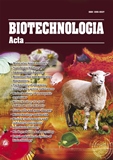ISSN 2410-7751 (Print)
ISSN 2410-776X (Online)

Biotechnologia Acta Т. 15, No. 6 , 2022
P. , Bibliography 26, Engl.
UDC: 615.283.+615.277.3
DOI: https://doi.org/15407/biotech15.06.070
Full text: (PDF, in English)
IN VITRO ANTILEUKEMIC ACTIVITY OF EUPHORBIA ECHINUS EXTRACT
1 Department of Molecular Biology and Genetics, Faculty of Engineering and Natural Sciences, Üsküdar University, Istanbul, Turkey.
2 Department of Bioengineering, Faculty of Engineering and Natural Sciences, Üsküdar University, Istanbul, Turkey.
3 Laboratory for improved soil productivity and environment, Higher Normal School, Mohammed V. University, Rabat, Morocco.
Aim. Cancer continues to pose a serious threat to human health. Euphorbia plants are rich in phenolics, aromatic esters, steroids and several bioactive compounds. Studies have shown the presence of a large number of bioactive compounds in E. echinus including flavonoids, phenolics, and proanthocyanins.
Method. There it was investigated cytotoxic effects of E. echinus methanolic extract on K562, HL60, Ishikawa, Raji and SH-SY5Y cells.
Results. The E. echinus extract was found to be highly cytotoxic against HL60 and K562 (79.78 and 76.44% cytotoxicity, respectively). DNA fragmentation was exclusively observed in K562 cells indicating that the reduction of viable cells following treatment with E. echinus extract is due to apoptosis.
Conclusions. Our results suggest that E. echinus extract might have a drug potential against leukemic cells.
Key words: Euphorbia echinus, cancer, K562 cells, HL60 cells.
© Palladin Institute of Biochemistry of National Academy of Sciences of Ukraine, 2022

